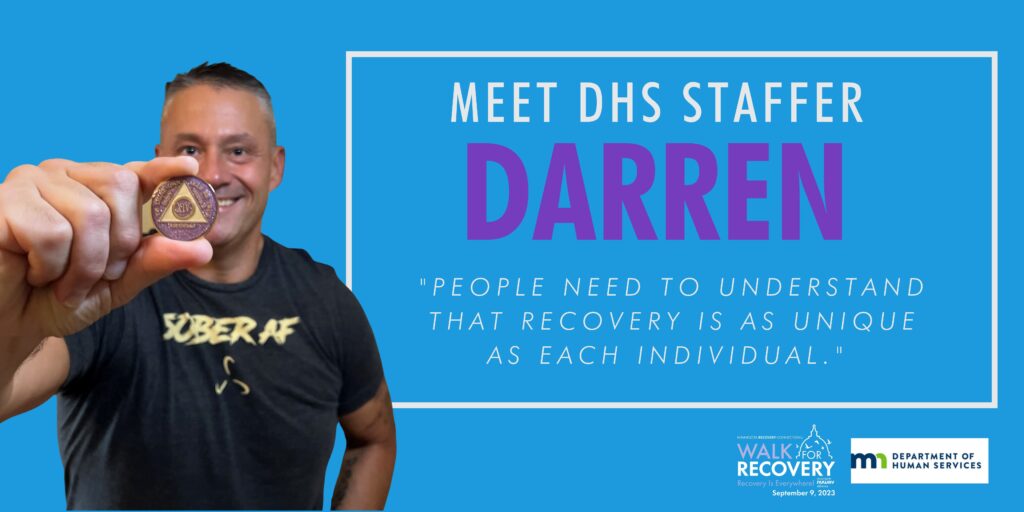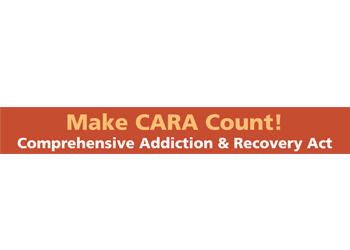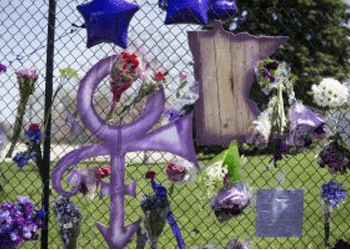
The Minnesota Department of Human Services is a proud sponsor of the Minnesota Recovery Connection’s 2023 Walk for Recovery, presented by NUWAY Alliance. We sat down with Darren Reed, Peer Recovery Services Coordinator in the Behavioral Health Division to learn more about his work.
What is your role at DHS? I’m the Peer Recovery Services Coordinator within the Behavioral Health Division and I work
alongside Shelley White. We support the work of billable and nonbillable peer recovery services for mental health and substance use disorder in Minnesota. In addition, we also work with the Recovery Community Organizations (RCOs) providing support and helping with all the processes that go along with developing Recovery Community Organizations.
Can you define both what a recovery organization is and what peer recovery means, for
those who don’t know? A Recovery Community Organization is a nonprofit organization led by individuals in the
recovery community who are focusing on recovery from substance use disorders. It doesn’t particularly have a certain type of philosophy, it’s not just about the 12 steps. It’s there for people in recovery to find resources in their community and find what works for them and sustain long-term recovery. A lot of times these organizations will facilitate and host recovery- type events, whether it’s sober social activities or educational classes and peer services.
Simply put, Recovery Community Organizations save lives. They really can help keep people sober or abstinent from their drug of choice while they’re figuring out what their recovery is going to look like. We know that a lot of the relapses occur in the first 90 days after onset of recovery – whether they just start on their own or they go to treatment. Recovery Community Organizations effectively bridge the gap between treatment and long-term recovery. Oftentimes when I worked at an RCO, people would come in and state that they hated the meetings they went to and so they wanted to quit and do it without support, which is very challenging. RCOs and Peer Services can help that recoveree find other options that may be a better fit. RCOs are not meant to replace existing meetings but rather ensure that the new recoveree has the resources to find support that is right for them. We know that having support in early recovery is the key to building sustainable recovery.
Peer Recovery Services is a name that has changed over the years. When I first got involved with it in 2010, it was called recovery coaching. And the idea was that somebody with lived experience with substance use disorder, with at least one year abstinence, could support someone. In peer relationships, they work with them on a one-on-one basis. It’s a process where they’re checking in to see how they’re doing in life, but also it depends where they’re at, because it can start before they even get to the treatment center. There’s so many different things that a person in early recovery has to worry about – housing and employment can be big problems. Ideally that recovery relationship with peer services is there to help them navigate early recovery until they get to long-term recovery.
How did you come to work in the recovery field? It’s really what my passion is. It’s a person in long-term recovery. I’m coming up on 15 years of recovery and I actually got involved with one of the first RCOs in the state back in 2010. At that point, I was about two years into my recovery. And I just love the RCO model, everything about it. I actually worked in prevention for quite a few years with the state until I found out about this opportunity. It was a natural fit for me. I wanted to give back and be able to help move the recovery policies forward in the right direction. For instance, making sure that the recovery voice is being heard in the policies we make – policies that really capture what life is like as a person in recovery and what it’s like in Minnesota. We have a role at DHS to create policy, but there’s also the communities, the Recovery Community Organizations and all of the individuals in
recovery, and we want to make sure that we are all meeting in the middle and we have a clear path that works for everyone, that the services are being done with integrity, and ultimately that those in recovery are getting the best service possible.
What is something most people don’t know DHS does in the recovery field? I think the biggest thing is that I don’t think people realize that we are active in the recovery process and that we’re eager to continue filling in those gaps in the continuum of care. Everyone knows that there’s treatment centers and some might know that DHS is involved with licensing and all that, but I don’t know how aware people are of how much we do in the whole continuum. For instance, we have a lot of programs for substance use prevention for the young kids and early adults, but then we also have this recovery piece and it’s growing. There’s collegiate recovery programs, and now there’s high school recovery programs. We’re working to bring all those programs together so that they all know each other and can work side-by-side.
What does the recovery community mean to you?
The recovery community is something I still rely on to this day. I need to have a community that I talk with and that I can feel like there’s others who are like me. That connection to others who are like you – even if we’re different in our walks of life or what we do for a living – to know that there are others who have struggled with the same type of issues that I have can be really reassuring and inspiring to keep going.
What do you wish more people understood about recovery?
People need to understand that recovery is as unique as each individual. It’s going to look a little different for everyone. Not everyone goes to the same types of meetings. Some people will do different things, have other supports in their life, and that’s OK. There’s a lot of different things people can do for their recovery. It’s not just about meetings.




